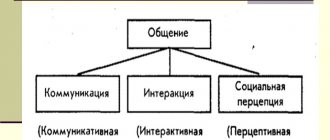Personality, individual, individuality - these concepts are often used as synonyms. And we, without hesitation, replace one with the other, and not only in relation to an adult or any representative of the biological species Homo sapiens. The word “personality” can be heard in a young mother’s story about her newborn baby, and even in the owner’s reasoning about her cat or dog.
In fact, this is too loose a treatment of serious psychological concepts. They are not synonyms and, despite the fact that each of these words denotes a set of human qualities, there are significant differences between them.
The concept of individual
An individual is a carrier of the biological component in a person. People as individuals represent a complex of natural genetically dependent qualities, the formation of which is realized during the period of ontogenesis, the result of which is the biological maturity of people. It follows that the concept of individual expresses the species identity of a person. Thus, every person is born an individual. However, after birth, the child acquires a new social parameter - he becomes a person.
In psychology, the first concept with which the study of personality begins is the individual. Literally, this concept can be understood as an indivisible particle of a single whole. Man as an individual is studied not only from the point of view of a single representative of the human race, but also as a member of a certain social group. This characteristic of a person is the simplest and most abstract, saying only that he is separated from others. This remoteness is not its essential characteristic, since all living beings in the Universe are fenced off from each other and in this understanding “individuals”.
So, the individual is a single representative of the human race, a specific bearer of all the social characteristics and psychophysical traits of humanity. The general characteristics of the individual are as follows:
— in the integrity of the psychophysical organization of the body;
- stability relative to the surrounding reality;
- in activity.
Another way to define this concept is the phrase “specific person”. Man as an individual exists from his birth until his death. An individual is the initial (initial) state of a person in his ontogenetic development and phylogenetic formation.
The individual, as a product of phylogenetic formation and ontogenetic development in specific external circumstances, however, is by no means a simple copy of such circumstances. It is precisely a product of the formation of life, interaction with environmental conditions, and not conditions taken by themselves.
In psychology, the concept of “individual” is used in a fairly broad sense, which leads to a distinction between the characteristics of a person as an individual and his traits as a person. It is their clear distinction, therefore, that underlies his delimitation of such concepts as individual and personality, and is a necessary prerequisite for the psychological analysis of personality.
Relationship between terms
Based on the definitions of “individual”, “personality” and “person”, their characteristics in society can be represented as a set of certain qualities and traits . Despite significant differences, there is a strong connection between these concepts. At birth, everyone has a set of properties that can be developed and improved, thereby becoming an outstanding personality. And vice versa, if there is an unwillingness to become part of society, the subject degrades, and therefore does not become an individual.
Taken together, all three concepts can be combined with the word “subject”. It is understood as an actively cognizing the world, a purposefully acting individual. He is able to take initiative, be independent, make and implement significant decisions and bear responsibility for this. The inextricable connection between the three concepts is due to the fact that they all relate to a specific biological being.
Social individual
Unlike young animals, the individual is practically devoid of innate adaptive instincts. Therefore, for survival and further development, he needs communication with his own kind. After all, only in society will a child be able to realize his innate potential and become an individual. Regardless of what society an individual is born into, he will not be able to do without the care and teaching of adults. For full development, a child needs a long time so that he can absorb all the elements and details that he will need in independent life as an adult member of society. Therefore, from the very first days of life, a child needs to be able to communicate with adults.
The individual and society are inseparable. Without society, an individual will never become an individual; without individuals, society simply will not exist. In the initial period of life, interaction with society consists of primary facial reactions, body language, with the help of which the baby informs adults about his needs and shows his satisfaction or dissatisfaction. The responses of adult members of a social group also become clear to him from facial expressions, various gestures and intonations.
As the child grows up and learns to speak, the language of gestures and facial expressions gradually fades into the background, but never throughout the adult life of the individual it completely loses its significance, transforming into the most important tool of nonverbal communications, which expresses feelings sometimes no less, and sometimes and more than ordinary words. This is due to the fact that gestures, facial expressions and postures are less controlled by consciousness than speech, and therefore, in some cases, are even more informative, telling society what the individual wanted to hide.
So, we can confidently say that social qualities (for example, communication) should be formed only in the process of interaction with society in general and communication with other people in particular. Any communication, verbal or non-verbal, is a necessary component for a person to become socialized. The social qualities of an individual are his abilities for social activity and the process of socialization. The earlier the socialization process begins, the easier it will be.
There are various forms of learning through which an individual is socialized, but they should always be used in combination. One of the methods that adults consciously use to teach a child to socially correct and approved behavior is reinforcement learning. Consolidation is realized through the targeted use of the method of rewards and punishments in order to demonstrate to the child which of his behaviors will be desired and approved, and which will be disapproving. In this way, the child is taught to comply with the elementary requirements of hygiene, etiquette, etc. that apply in society.
Some elements of an individual’s everyday behavior can become quite a habit, which leads to the formation of strong associative connections – the so-called conditioned reflexes. One of the channels of socialization is the formation of conditioned reflexes. Such a reflex, for example, could be washing your hands before eating. The next method of socialization is observational learning.
An individual learns how to behave in society by observing the behavior of adults and trying to imitate them. Many children's games are based on imitating the behavior of adults. Role-based social interaction of individuals is also learning. An adherent of this concept, J. Mead, believes that mastering social norms and rules of behavior occurs through interactions with other people and through various games, especially role-playing games (for example, playing mother and daughter). Those. learning occurs through interaction. By participating in role-playing games, the child brings to life the results of his own observations and his initial experience of social interaction (visiting a doctor, etc.).
Socialization of an individual occurs through the influence of various agents of socialization. The most important and first such agent in the process of social formation of an individual is the family. After all, it is the first and closest “social environment” of the individual. The functions of the family regarding the child include caring for his health and protection. The family also satisfies all the basic needs of the individual. It is the family that initially introduces the individual to the rules of behavior in society and teaches communication with other people. In the family, he first becomes acquainted with gender role stereotypes and undergoes gender identification. It is the family that develops the primary values of the individual. However, at the same time, the family is the institution that can cause the greatest harm to the process of socialization of the individual. For example, the low social status of parents, their alcoholism, conflicts in the family, social alienation or single-parent families, various deviations in the behavior of adults - all this can lead to irreparable consequences and leave an indelible imprint on the child’s worldview, his character and social behavior.
School is the next agent of socialization after family. It is an emotionally neutral environment, which is fundamentally different from the family. At school, the child is treated as one of many and in accordance with his real characteristics. In schools, children learn practically what success and failure are. They learn to overcome difficulties or get used to giving in to them. It is the school that forms an individual’s self-esteem, which, most often, remains with him throughout his adult life.
Another important agent of socialization is the environment of peers. During adolescence, the influence of parents and teachers on children weakens, along with this, the influence of peers increases. All academic failures and lack of parental attention are compensated by the respect of peers. It is among his peers that the child learns to resolve conflict issues and communicate as equals. And in school and family, all communication is built on hierarchy. Relationships in a peer group allow an individual to better understand himself, his strengths and weaknesses.
The needs of the individual are also better understood through group interaction. The social environment of peers makes its own adjustments to the value ideas instilled in the family. Also, interaction with peers allows the child to identify with others and, at the same time, stand out among them.
Since groups of different affiliations interact in the social environment: family, school, peers, the individual faces some contradictions. For example, an individual’s family values mutual assistance, but at school the spirit of competition dominates. Therefore, an individual has to feel the influence of different people. He tries to fit into different surroundings. As an individual matures and develops intellectually, he learns to see such contradictions and analyze them. As a result, the child creates his own set of values. The formed values of an individual allow them to more accurately define their own personality, outline a life plan and become an proactive member of society. The process of forming such values can be a source of significant social change.
Also among the agents of socialization it is necessary to highlight the media. In the process of their development, the individual and society continuously interact, which determines the successful socialization of the individual.
Individual behavior
Behavior is a special form of activity of the human body, which masters the environment. In this aspect, behavior was considered by I. Pavlov. It was he who introduced this term. With the help of this term, it has become possible to display the sphere of relationships between an individual interacting individual and the environment in which he exists and interacts.
Individual behavior is the individual’s reaction to any changes in external or internal conditions. It can be conscious or unconscious. Human behavior develops and is realized in society. It is associated with goal setting and speech regulation. The behavior of an individual always reflects the process of his integration into society (socialization).
Any behavior has its reasons. It is determined by the events that precede it and cause a certain form of manifestation. Behavior is always purposeful.
An individual's goals are based on his unmet needs. Those. any behavior is characterized by the goal that it seeks to achieve. Goals perform motivating, controlling and organizational functions and are the most important management mechanism. To achieve them, a number of specific actions are performed. Behavior is also always motivated. Whatever the behavior, challenging or detached, it necessarily contains a motive that determines the immediate form of its manifestation.
In the process of technological progress in modern science, another term has appeared - virtual behavior. This type of behavior combines theatricality and naturalness. Theatricality is due to the illusion of natural behavior.
The behavior of an individual has the following characteristics:
— level of activity (initiative and energy);
— emotional expressiveness (the nature and intensity of manifested affects);
- pace or dynamism;
- stability, which consists in the constancy of manifestations in different situations and at different times;
— awareness based on understanding one’s behavior;
- arbitrariness (self-control);
— flexibility, i.e. changes in behavioral reactions in response to environmental transformations.
Strong-willed traits of people
Adjusting behavioral factors associated with overcoming internal and external discomfort makes it possible to determine personal qualities: the level of effort and plans for taking actions, concentration in a given direction. Will manifests itself in the following properties:
- willpower - the level of effort to achieve the desired result;
- perseverance – the ability to mobilize to overcome troubles;
- endurance - the ability to limit feelings, thinking and actions.
Courage, self-control, commitment are the personal qualities of strong-willed people. They are classified into simple and complex acts. In a simple case, incentives to action flow into execution automatically. Complex acts are carried out on the basis of motivation, drawing up a plan and taking into account the consequences.
individual personality individuality
An individual is a living being that belongs to the human species. A person is a social being who is included in social interactions, participates in social development and performs a specific social role. The term individuality is intended to emphasize the unique image of a person. This is how a person's image differs from others. However, with all the versatility of the concept of individuality, it still, to a greater extent, denotes the spiritual qualities of the individual.
Individual and personality are not identical concepts; in turn, personality and individuality form integrity, but not identity. The concepts of “individuality” and “personality” contain different dimensions of a person’s spiritual nature. A personality is more often described as strong, independent, thereby highlighting its active essence in the eyes of others. And the individuality is bright and creative.
The term “personality” is distinguished from the terms “individual” and “individuality”. This is due to the fact that personality develops under the influence of social relationships, culture, and environment. Its formation is also determined by biological factors. Personality as a socio-psychological phenomenon presupposes a specific hierarchical structure.
The personality is the object and product of social relationships, feels social influences, and refracts them, transforming them. It acts as a set of internal conditions through which the external influences of society are modified. Such internal conditions are a combination of hereditary-biological qualities and socially determined factors. Therefore, personality is a product and object of social interaction, and an active subject of activity, communications, self-knowledge and consciousness. The formation of personality depends on activity, on the degree of its activity. Therefore, it manifests itself in activity.
The role of biological factors in the development of personality is quite large, but the influence of social factors cannot be neglected. There are certain personality traits that are particularly influenced by social factors. After all, you cannot be born a person, you can only become a person.
Personal qualities
The definition of “personality” is understood as a specific subject who is distinguished by the ability of cognition, self-awareness, emotional experiences, as well as the ability to influence the world around him and build relationships with other individuals. Psychologists believe that this term refers to anyone who occupies a position in society and is capable of fulfilling a certain role.
Personality cannot be formed outside of society and without connection with it; its main characteristics are the following potentials:
- informative;
- creative;
- communicative;
- value;
- art.
The will of a responsible subject, the ability to control one’s life and build relationships are considered the basis for personal development. These are individuals who understand that natural inclinations cannot control the mind, and a person must consciously guide his own behavior.
For example, a three-year-old child cannot be considered a mature personality. He is not yet aware of why he acted this way and not otherwise, and what consequences his action may lead to. He acts based on his upbringing and habits that he developed in childhood.
It is difficult to call a person who does not have a stable, solid “I” a personality. Many people live in a pattern, mechanically reacting to what is happening in the world around them, and follow exclusively their instincts. If there are adequate habits and their reasonable external manifestations, a decent person appears in society, but without his own “I”.
The formation and definition of a person as an individual is a long process that is associated with:
- with the choice of social roles and functions performed;
- awareness and acceptance of rules and norms of behavior;
- the ability to build relationships and be part of society;
- choose your behavior model responsibly and independently.
It should be understood that in society those who are capable of being different from everyone else always attract attention. But psychologists focus on those features that make this happen. One can always be called a person who knows how to stand out, but not everyone who stands out has the right to be considered a person. Only worthy behavior is the main social characteristic of a subject. Outstanding people have always been distinguished by their determination and willpower, and they are usually perceived as role models.
Individual and group
A group is a relatively isolated collection of individuals who are in fairly stable interaction and also carry out joint actions over a long period of time. A group is also a collection of individuals who share socially defined characteristics. Collaborative interaction in a group is based on a specific common interest or is associated with the achievement of a specific common goal. It is characterized by group potential, which allows it to interact with the environment and adapt to the transformations that occur in the environment.
The characteristic features of the group are the identification of each member of himself, as well as his actions with the group as a whole. Consequently, in external circumstances, everyone speaks on behalf of the group. Another feature is interaction within the group, which has the nature of direct contacts, observation of each other’s actions, etc. In any group, along with the formal division of roles, an informal division of roles will necessarily develop, which is usually recognized by the group.
There are two types of groups: informal and formal. Regardless of the type of group, it will have a significant impact on all members.
The interaction between the individual and the group will always be of a dual nature. On the one hand, the individual, through his actions, helps solve group problems. On the other hand, the group has a huge influence on the individual, helping him satisfy his specific needs, for example, the need for security, respect, etc.
Psychologists have noticed that in teams with a positive climate and active intra-group life, individuals have good health and moral values, they are better protected from external influences, they work more actively and efficiently than individuals who are in an isolated state or in groups with negative climate, which are plagued by intractable conflict situations and instability. The group serves for protection, support, training and problem solving skills, and the required norms of behavior in the group.
What is individual?
The main difference is the lack of specific, unique features. This is a person who belongs to the crowd, has similar characteristics, conforms to basic stereotypes and is susceptible to public opinion.
Such a person has not grown personally. At the everyday level, we can cite the following traits of an individual who never became a person:
- inability to make decisions;
- lack of responsibility for events;
- low social adaptability;
- following the opinion of the majority;
- lack of point of view;
- the ability to manipulate the person in question.











